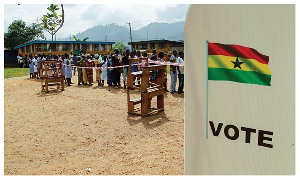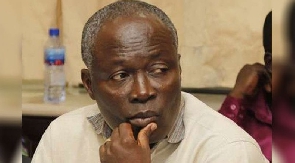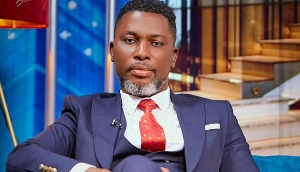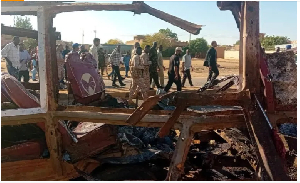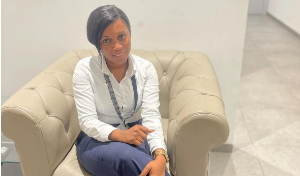Like many Ghanaians, I have noticed the parallels in the campaign language used by the opposition party in the December 7, 2024 election campaigns and that used by and the ruling administration in the 2016 general polls.
The rhetoric of the opposition mostly consisted in accusations of corruption, economic mismanagement, a lack of respect of the rule of law, and a failure to uphold accountability, an identical framework, varying only in the subtleties of the assessment of veracity in these allegations when considered in relation to one another.
Whether one chooses to examine the validity of these assertions or not, it is undeniable that the two predominant political parties in Ghana engage in a struggle for supremacy, ultimately imposing similar outcomes upon the populace, albeit in varying manifestations.
As it may appear, we are therefore frequently forced to decide which of two evils, in our own judgements, is the lesser of two.
This article may resonate with you in unexpected ways, especially as we approach the moment to exercise our right to democracy. However, if we are to advance as a nation and fulfil our destiny of leading Africa back to greatness, it is crucial that we engage in these difficult conversations.
Over the years, the nation's political landscape has garnered an excessive degree of influence over the people’s will, leading to what many have described as a leadership crisis. This leadership problem in Ghana calls for a whole rethink of the mechanics of power privileges.
Beyond the prospect of political redemption, the nation's deteriorating systems, governed by misleading decision-making and erratic policy frameworks, have resulted in a watershed from which, as a people, we must seek to restore our nation.
This realization means that the results of the elections on December 7, 2024, may not heal us; rather, they will present a dire challenge that we can only lessen if we collectively embrace our responsibilities as leaders across diverse strata of our society.
A failed leadership experiment:
As expressed earlier, Ghana’s political context has been endowed with excessive power, and for years, we have entrusted our political leaders with the management of our potential to thrive and compete on a global scale. Yet, these leaders, to whom we have delegated the authority to make pivotal decisions impacting our existence, consistently fail to allocate sufficient resources or any form of capital toward the betterment of our society. They would much prefer to make investments in their own benefit.
Citizens who are not blinded along partisan lines have seen and debated, in the past eight months leading to the December polls, how political involvement in Ghana's illegal gold mining business, known as "Galamsey," for instance, poses serious risks to public health and environmental integrity. The news reports, damning as they were about the scourge, situate the current government at the centre of the upscale in the irresponsible manner in which mining licenses were awarded to incompetent concessions manned by people who would care nothing about following regulations governing activities in that sector.
Due to the government's silence and later pathetic responses on the issue, it is believed that the government sheltered illegal miners despite the negative consequences in exchange for political and financial gain.
You see, politicians don't care how much damage their actions cause to the people, including the unborn generations, as long as it gives them an advantage over their political opponent or serves their winning strategy.
The need for change drivers:
If I were to overlook the numerous offences committed against the populace by those in power and focus solely on the issue of “Galamsey”, a problem that predates President Nana Akufo-Addo's administration—despite their dubious endorsement of these operations in an exceedingly irresponsible manner, worsening the healthcare burden—I could potentially engage you, whether you reside in Ghana or abroad, in the pursuit of transformative efforts aimed at salvaging our nation and, by extension, the African continent at large. We find ourselves in an era where we, as a society, have passively observed the deterioration of our water bodies nationwide, as harmful substances used by miners, such as mercury and cyanide, contaminate water supplies and devastate aquatic ecosystems. Meanwhile, this crisis exacerbates the strain on the nation's healthcare system.
Environmental damage, particularly in areas where substantial mining has occurred, has reduced agricultural output, essentially pushing the country toward poverty. This is the most severe of all the evils inflicted by our country's politicians; the effects take decades to fully manifest, putting life as our people know it in jeopardy.
Things are not going well for our country, Ghana. We have lost sight of our identity, our past and early post-colonial history, and our future, and we are in a dark pit. We have a very distorted idea of what we can accomplish on a global level, and the students who are growing up in our schools know very little about their geopolitical heritage.
By the way, the present condition of the educational system is quite disturbing, and I find it challenging to express the degree of my dissatisfaction over its chaos.
A revival in leadership:
What alternatives do we have beyond electing trustworthy individuals to public office? We must engage in both minor and significant acts of patriotism. We will go into the trenches to recover what remains of our porous systems and seek to repair the ones that require repair while reinforcing the systems that are under threat.
In relation to the exercise of our democratic rights, it is imperative that we all engage in the voting process and maintain a watchful presence during the interval between casting our votes and the announcement of the results. Along with Vice President Mahamadu Bawumia and former NDC President John Mahama, there are additional candidates on the ballot for the elections on December 7. In my considered judgement, the other eleven candidates have failed to exhibit a clear understanding of their objectives and have not provided sufficient assurance that they comprehend the challenges they would face if entrusted with the responsibilities of leadership.
Practically speaking, we are on our own, and we need to prepare ourselves to engage with whichever party the majority votes back into power, be it the NDC or the NPP. It is crucial that we, as labour unions, student representatives, religious groups, and others, prepare to implement significant changes for the benefit of future generations.
Ghana's politicians can no longer pretend to repair the damage they have caused; instead, you and I, the country's true leaders, must awaken from our sleep and muster the courage to begin pushing for the change we desire, beginning in our communities even as we work with and through these political officeholders.
Click to view details



General News of Friday, 6 December 2024
Source: Juanita Sallah





